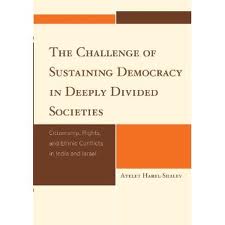Breaking
- MENU

Both India and Israel are plural and divided societies, with non-consociational form of governance. In spite of their diversity and a dominant majority in terms of demography, both countries have managed to sustain their democracy well into their seventh decade of their existence, albeit with certain questionable phases of aberration, for example the emergency rule in India under Indira Gandhi. Recognizing their different political formulas to deal with their respective societies, the book seeks to elements of commonality between India and Israel. Towards accomplishing this task, the book is divided into three parts. The first part deals with the conceptual framework. The second part deals with the empirical and analytical findings of the study, looking into the minority-majority relations, the public and judicial policy and then, comparing them within a broader context of ‘Democracies that did not survive’. The final part of the book concludes the study and tests the proposed hypotheses.
Ayelet Harel-Shalev asserts that such ‘democracies can sustain their political regimes by developing legal rights that embody some degree of autonomy for minorities but without allowing them significant access to state power’ (p.5). In the case of India, constitutional provisions are in place along with regular, impartial elections. In Israel, its Arab citizens or ‘Arab-Palestinians’ as Harel-Shalev describes them, are provided certain rights, like religious and civil, to ensure their autonomy within the Jewish majoritarian state structures. Further, additional test cases of Cyprus and Sri Lanka are explored to serve as background cases against which the core cases of India and Israel are investigated.
Harel-Shalev utilizes certain well accepted norms from the domain of political science in defining democracy, forms of government, and her rationale in calling the two cases ‘deeply-divided societies’. The book categorically delves into the historicity of the two countries, studying specific aspects like citizenship, religious policies, minority treatment, land-ownership rights and affirmative action. Such a study not only helps in forming clarity in the comparative understanding of the chosen case studies (the main purpose of the study), but also enables the understanding these two cases in parallel, which shows commendable scholarship. The exhaustive bibliography and references furthers this fact.
The book is the first of its kind in such an extensive comparison between India and Israel in terms of its governance and policies, stretching over a period of sixty years. Even with many similarities between these two states, their differences set them apart quite significantly. In terms of religious influences over laws and policies, the case of Israel is much closer to the mark than that of India, with its emphasis on secularity and equal respect of all religion. The personal laws in Israel, while granting religious rights, severely undercut the secular space in the private domain. Shrouded in constitutions provisions, the land-ownership rights for the minorities is much difficult to identify and analyze in the case of India, where there is a huge gap between legality and practice. Such differences make the comparison rather difficult. Moreover, as identified by the author herself, both India and Israel are regarded as ‘exceptions’ to the norm in terms of its capacity of sustaining democracy, marking both the states unique in their approach towards democracy. In such a scenario, comparatives can be drawn only to an extent, being subjected to case-specific limitations.
In spite of such formal differences, the book reaches the conclusion that both Israel and India pertains to a high degree of similarity in coping with their respective schisms – ethno-religious in India and ethno-national in Israel. In the face of pluralism, the factors like the need to maintain a common identity to unify citizens in the face of adversity pushed both the states to remain democratic, in granting religious, cultural and political rights. However, both India and Israel refuse to recognize its dominant minority, namely Indian Muslims and Israeli Arabs respectively, as a national minority to uphold the national unified identification of being Indian and Israeli. Even with different forms of government and differing state policies, both countries strive to maintain democracy by incorporating and embracing their social plurality, rather than forcibly enforcing uniformity among their citizens.
This book is a definite contribution in the existing theoretical and empirical studies dealing with India and Israel, opening new avenues for future possible research concerning these countries and in the understanding of sustainability of democracy in deeply divided societies.
Sonia Roy is a doctoral candidate in the School of International Studies, Jawaharlal Nehru University, New Delhi. Email
As part of its editorial policy, the MEI@ND standardizes spelling and date formats to make the text uniformly accessible and stylistically consistent. The views expressed here are those of the author and do not necessarily reflect the views/positions of the MEI@ND. Editor, MEI@ND: P R Kumaraswamy
Bridging the Barrier: Israeli Unilateral Disengagement by Tami Amanda Jacoby, (Aldershot: Ashgate Publishing Limited, 2007, 157 pages, £55....
Read More »From Fatwa to Jihad: The Rushdie Affair and Its Legacy by Kenan Malik, (London: Atlantic Books, 2009, 266 Pages) VALENTINE&rsquo...
Read More »Non-Resident Indian Entrepreneurs in the United Arab Emirate, by Prakash C Jain, (New Delhi: Manak Publications, 2010, ISBN 978 81 7831 189 0; ...
Read More »The Vital Triangle – China, United States and The Middle East by Jon B. Alterman & John W. Garver (Washington, DC: Center for Interna...
Read More »